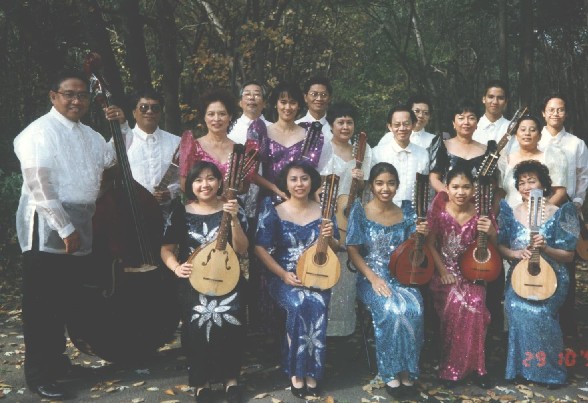Rondalla

The term rondalla refers to the native string ensemble of the Philippines, and it consists of plectrum instruments such as the bandurria, laud, octavina, mandola, guitarra, and bajo de uñas(supplanted today by the regular double bass). Although Spanish in origin, notably in plucked string ensembles like murga and estudiantina that were popular in the 18th century Europe, the rondalla's development, functions, repertoire, and instrumentation are distinctly Filipino. The Filipino people not only modified the appearance and acoustical design of the European models but also developed them to have a wider range, greater versatility, and more resonance. Like the Philippine marching band, the rondalla has figured prominently in the Philippine community life, providing accompaniment to folk dancing, singing, and entertaining with solo pieces at various functions. But the marching band lacks the intimate character and appeal of the rondalla. For whether heard in the poignant romanticism of the harana or serenade, in the melancholic passion of the kundiman, or in the lilting cadence of the balitaw, polka and paso-doble, the rondalla never fails to draw the listener into its warm, cozy ambience.
In the early 1900, it was fairly common for rondallas to play symphonic overtures and arias from standard operas. During fiestas, rondallas from varied Philippine towns would gather in one place and engage in what was called 'tambakan' or marathon playing where they would show off their performing skills - an event that usually lasted up to the wee hours of the morning when the participants had finally run out of pieces.
The rondalla later flourished in civil and educational institutions as well as in commercial companies. The better known ones were the Yellow Taxi Rondalla, the Manila Simbunsya Rondalla, the Teatro Zarsuela Rondalla, the Centro Escolar University Rondalla, and Juan Silos Rondalla. At the 1976 National Rondalla Competition held in Manila, some 70 rondallas competed. The Batangas Junior Rondalla composed of high school kids who performed Tchaikovsky's 1812 Overture won first place in that competition.
Sad to say, however, the rondalla is a fast-disappearing art in the Philippines. It is quite heartening that Filipino-Americans are rediscovering their musical heritage, and dedicated people in both coasts, like the U.P. Alumni and Friends Rondalla, are committed to preserving the rondalla as an integral part of this legacy.

The UPA&FR HomePage was created on October 22, 1995
and is maintained by J. Sonny Santos©1995
jayars3@hotmail.com
jayars@msn.com
![]()